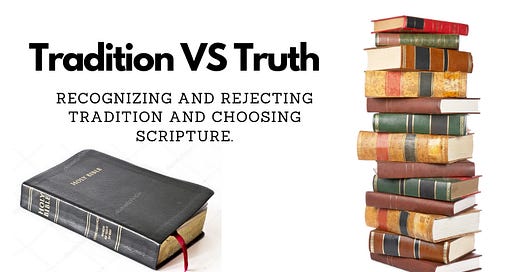Tradition and Scripture are two essential elements within many religious practices, often intertwined but distinct in their sources and authority. While scripture refers to the sacred texts considered as God’s revelation, tradition encompasses beliefs, practices, and teachings passed down through generations within a religious community. Here, we will explore the differences between tradition and scripture and how some churches incorporate man-made doctrines and traditions that deviate from scripture.
Tradition vs. Scripture
Scripture
Scripture represents the sacred writings deemed as inspired by God, serving as the bedrock of faith and conduct for numerous religious traditions. In Christianity, the Bible, which is God’s Word, is the ultimate authority and guide for our daily lives.
Tradition:
Tradition encompasses rituals, beliefs, customs, and interpretations transmitted orally or through writings within religious communities. While certain traditions align with scripture, others may emerge independently or evolve over time, reflecting the cultural and historical contexts of the faith community.
Man-made Doctrines and Traditions
Many churches and denominations incorporate man-made doctrines and traditions that may lack explicit support in scripture. These additions can range from minor rituals to significant theological tenets.
Examples of Man-made Doctrines and Traditions:
Lent: A period of fasting and penance observed by many Christians preceding Easter, though not explicitly mandated in scripture.
Infant Baptism: The practice of baptizing infants, lacking clear scriptural endorsement for the baptism of those incapable of professing faith.
Confession to a Priest: In some traditions, confessing sins to a priest is obligatory, diverging from scripture's emphasis on direct confession to God (1 John 1:9).
Purgatory: The belief in a post-death state of purification, not directly supported by scripture.
Church Creeds and Constitutions: Statements of faith and organizational frameworks within Christian denominations, often containing theological formulations not explicitly detailed in scripture. Often filled with doctrinal statements supported by proof texts that have been pulled out of context.
The "Sinner's Prayer": A verbal expression of repentance and invitation to Jesus for salvation, lacking explicit biblical mandate. It is foreign to scripture.
Calvinism: The theological teachings emphasizing doctrines such as predestination and unconditional election, imposing systematic theological frameworks onto scripture. Man-made doctrine that contradicts scripture.
Asking Jesus into Your Heart: The notion of inviting Jesus into one's heart for salvation, though lacking explicit scriptural warrant.
The Roman Catholic Church as an Example
The Roman Catholic Church exemplifies placing tradition with or above scripture, elevating certain traditions to the status of infallible doctrine.
Examples of Catholic Traditions:
Papal Infallibility: The doctrine asserting the Pope's immunity from error when defining matters of faith or morals.
Mariology: The veneration of Mary, including doctrines like the Immaculate Conception and the Assumption, which lack explicit scriptural foundation.
Sacraments: Practices such as confession, confirmation, and the Eucharist, evolving into sacramental theology with teachings distinct from scripture.
What’s the Big Deal?
Dangers of Adding to or Taking from God's Word:
Scripture cautions against tampering with its content, emphasizing the purity and integrity of God's word (Deuteronomy 4:2; Revelation 22:18-19). Distorting divine truth or imposing human interpretations over scripture undermines its authority.
2 You shall not add to the word which I command you, nor take from it, that you may keep the commandments of the Lord your God which I command you. - Deuteronomy 4:2
18 For I testify to everyone who hears the words of the prophecy of this book: If anyone adds to these things, God will add to him the plagues that are written in this book; 19 and if anyone takes away from the words of the book of this prophecy, God shall take away his part from the Book of Life, from the holy city, and from the things which are written in this book. - Revelation 22:18-19
Worship in Truth
Recognizing the disparity between tradition and scripture is paramount in evaluating religious doctrines and practices. While tradition can enrich spiritual life, it must harmonize with scriptural principles. Churches should continually scrutinize their doctrines to ensure fidelity to God's authoritative word. If it’s a man-made doctrine and tradition it is nothing more than vain worship (Mark 7:7-13)
As Proverbs 30:5-6 admonishes, "Every word of God is pure... Do not add to His words, Lest He rebuke you, and you be found a liar." Upholding the sanctity and authority of scripture guards against doctrinal deviations and ensures faithful adherence to divine truth.





